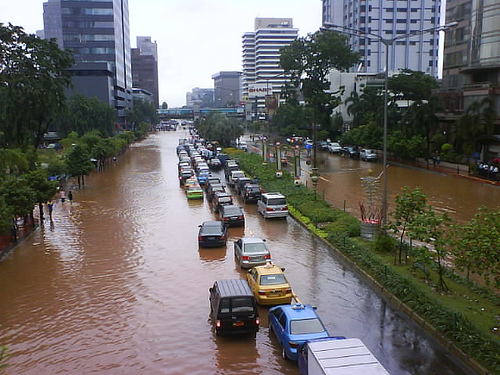Jonathan Pugh, Newcastle University, talking about his paper in Area on uncertainty and what it means for governing everyday life.
“But resilience does not seek to control the world in the way of previous scientific and political models. Instead, resilience more obviously foregrounds how vulnerability and insecurity are inevitable parts of life. Risks, hazards and dangers are accentuated as permanent features of everyday existence; always there, always at the surface to be highlighted and engaged. Precarity bears down upon the present and resilience politics actively embraces it.”
By Jonathan Pugh, Newcastle University
 Flood on Protocol Street, Jakarta Image. Credit: Flicker user mulya reproduced under 74 CC-BY-NC-ND
Flood on Protocol Street, Jakarta Image. Credit: Flicker user mulya reproduced under 74 CC-BY-NC-ND
The word ‘resilience’ seems to capture something about life in our precarious and uncertain era. The idea that we should all learn to be more resilient and adaptable, able to rapidly adjust to crises and the complexities of modern life as they happen, says something about the mood of our times. Indeed, Time Magazine recently proclaimed ‘resilience’ to be the buzzword of the moment (Walsh, 2013). Development agencies, governments, social critics and academics increasingly focus upon how to make people and places more resilient (Department for International Development, 2013). Adger (2000:347) for example says that social resilience is “the ability of groups or communities to cope with external stresses and disturbances as a result of social, political and environmental change”. But in many unexplored ways the turn toward ‘resilience’ also tells…
View original post 548 more words
